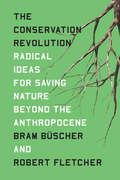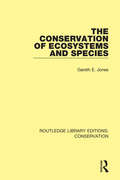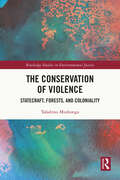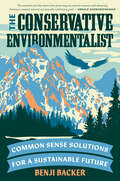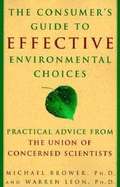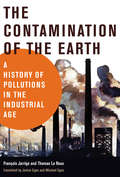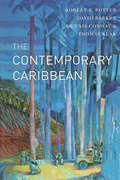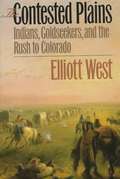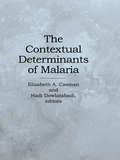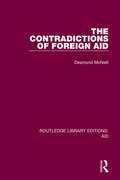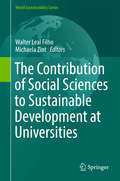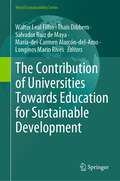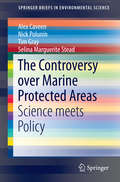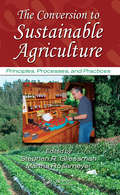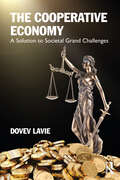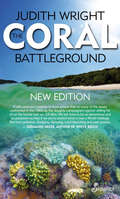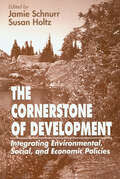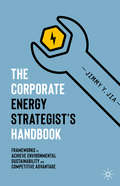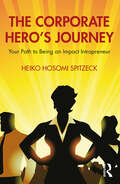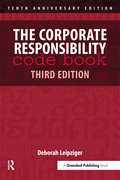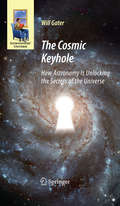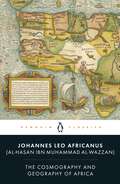- Table View
- List View
The Conservation Revolution: Radical Ideas for Saving Nature Beyond the Anthropocene
by Robert Fletcher Bram BuscherA post-capitalist manifesto for conservationConservation needs a revolution. This is the only way it can contribute to the drastic transformations needed to come to a truly sustainable model of development. The good news is that conservation is ready for revolution. Heated debates about the rise of the Anthropocene and the current &‘sixth extinction&’ crisis demonstrate an urgent need and desire to move beyond mainstream approaches. Yet the conservation community is deeply divided over where to go from here. Some want to place &‘half earth&’ into protected areas. Others want to move away from parks to focus on unexpected and &‘new&’ natures. Many believe conservation requires full integration into capitalist production processes. Building a razor-sharp critique of current conservation proposals and their contradictions, Büscher and Fletcher argue that the Anthropocene challenge demands something bigger, better and bolder. Something truly revolutionary. They propose convivial conservation as the way forward. This approach goes beyond protected areas and faith in markets to incorporate the needs of humans and nonhumans within integrated and just landscapes. Theoretically astute and practically relevant, The Conservation Revolution offers a manifesto for conservation in the twenty-first century—a clarion call that cannot be ignored.
The Conservation of Ecosystems and Species (Routledge Library Editions: Conservation #3)
by Gareth E. JonesOriginally published in 1987, Conservation of Ecosystems and Species examines conservation as a major world issue for governments, industrialists and the general public. The need for conservation has become more urgent as human activity continues to encroach upon the remaining natural ecosystems of our planet. This book examines a wide range of conservation issues and explains the scientific reasons why conservation of ecosystems and species is important, not merely for its own sake, but for the future of humanity. It charts the development of conservation policy around the concept and understanding of the ecosystem. The roles of the planner, the industrialist and the politician in the development of a conservation policy are described.
The Conservation of Violence: Statecraft, Forests, and Coloniality (Routledge Studies in Environmental Justice)
by Tafadzwa MushongaThe Conservation of Violence explores the governance of protected forests in Zimbabwe, highlighting the structural and operational mechanism through which violent tactics are produced, employed, and sustained to promote nature conservation. Drawing on political ecology, geography, and environmental politics, it examines the central role of the state in conserving conservation violence. The book presents contemporary cases studies of violence in conservation and introduces the concept of conservation of violence as an alternative framework for understanding the tenacity of violence in conservation areas across Africa. It also delves into the constitutionalisation of environmental rights, illustrating how these rights have been leveraged to enable and preserve conservation violence, as well as the ways in which militarisation fosters and circulates violence. By offering new ways for investigating violence in conservation, the book interrogates the complexities of dismantling entrenched systems of violence and provides insights into the theoretical and practical obstacles of transforming conservation ideologies. The explored include coloniality, nature-culture dichotomies, resource governance, extraction, capitalism, sustainability, policy and conservation law, regulation and policing, environmental rights, and environmental justice. The Conservation of Violence will be a significant contribution to the fields of political ecology, geography, development, environmental justice, and the broader environmental humanities.
The Conservative Environmentalist: Common Sense Solutions for a Sustainable Future
by Benji BackerA young, conservative environmentalist provides an intrepid vision for both solving our climate crisis and prioritizing the American national interest.Politicians, pseudo-experts, and other partisans have led us to believe that there are only two approaches to climate change: doomerism or denial. Benji Backer, Founder and Executive Chairman of the American Conservation Coalition, argues that both are dead ends. In The Conservative Environmentalist, he delivers an entirely new strategy to take care of the planet while putting put the economic interest of the American people first. Backer makes the compelling case that conservative principles are the key to climate solutions that actually work. In this book, you&’ll visit the country&’s most diverse ecosystems and consequential manufacturing hubs—from Utah coal mines and Texas oil fields to Louisiana wetlands and Rhode Island offshore wind farms—witnessing the power of individual entrepreneurship and local problem-solving. You&’ll be inspired by groundbreaking efforts to strengthen earth&’s ecosystems (that Green New Dealers and other Big Government advocates would prefer to keep hidden), like partnerships between oil and gas companies and environmental nonprofits to preserve thousands of acres of wetlands. Drawing on cutting-edge science, a deep understanding of local community needs, and his experience rallying politicians on both sides of the aisle to take action, Backer offers hope for everyone who cares about the state of the great outdoors. Fascinating, clear-headed, and full of surprises, The Conservative Environmentalist is the fresh, audacious approach needed to ensure a sustainable future, and particularly one that works for America.
The Constant Economy: How to Create a Stable Society
by Zac GoldsmithA timely, inspiring manifesto combining the power of markets with the will of people to effect change for the ultimate survival of the planet Since the industrial revolution, the economies of developed nations have grown at the expense of the natural world, but the earth's resources are finite, climate change threatens to dramatically transform how and where people live, and the global economic system is in disarray. Offering an urgently needed alternative model, this book argues for the creation of a "constant economy," in which resources are valued not wasted, food is grown sustainably, and goods are built to last. The constant economy operates at the human scale, and above all it recognizes nature's limits. This book explains that almost every action needed to support the environment is already being carried out somewhere in the world, by companies, communities, and governments determined to blaze a trail. Where they have done the right thing, their customers and voters have rewarded them. Practical solutions exist, and they are brought together and set out in this groundbreaking book.
The Consumer’s Guide to Effective Environmental Choices: Practical Advice from The Union of Concerned Scientists
by Michael Brower Warren LeonFrom one of the most prestigious nonprofit organizations devoted to environmental issues comes a clear, practical, and rational overview of the relationship between consumers and the environment. Paper or plastic? Bus or car? Old house or new? Cloth diapers or disposables? Some choices have a huge impact on the environment; others are of negligible importance. To those of us who care about our quality of life and what is happening to the earth, this is a vastly important issue. In these pages, the Union of Concerned Scientists help inform consumers about everyday decisions that significantly affect the environment. For example, a few major decisions--such as the choice of a house or vehicle--have such a disproportionately large affect on the environment that minor environmental infractions shrink by comparison. This book identifies the 4 Most Significant Consumer-Related Environmental Problems, the 7 Most Damaging Spending Categories, 11 Priority Actions, and 7 Rules for Responsible Consumption. Learn what you can do to have a truly significant impact on our world from the people who are at the forefront of scientific research.
The Contamination of the Earth: A History of Pollutions in the Industrial Age (History for a Sustainable Future)
by Francois Jarrige Thomas Le RouxThe trajectories of pollution in global capitalism, from the toxic waste of early tanneries to the poisonous effects of pesticides in the twentieth century.Through the centuries, the march of economic progress has been accompanied by the spread of industrial pollution. As our capacities for production and our aptitude for consumption have increased, so have their byproducts—chemical contamination from fertilizers and pesticides, diesel emissions, oil spills, a vast “plastic continent” found floating in the ocean. The Contamination of the Earth offers a social and political history of industrial pollution, mapping its trajectories over three centuries, from the toxic wastes of early tanneries to the fossil fuel energy regime of the twentieth century.The authors describe how, from 1750 onward, in contrast to the early modern period, polluted water and air came to be seen as inevitable side effects of industrialization, which was universally regarded as beneficial. By the nineteenth century, pollutants became constituent elements of modernity. The authors trace the evolution of these various pollutions, and describe the ways in which they were simultaneously denounced and permitted. The twentieth century saw new and massive scales of pollution: chemicals that resisted biodegradation, including napalm and other defoliants used as weapons of war; the ascendancy of oil; and a lifestyle defined by consumption. In the 1970s, pollution became a political issue, but efforts—local, national, and global—to regulate it often fell short. Viewing the history of pollution though a political lens, the authors also offer lessons for the future of the industrial world.
The Contemporary Caribbean
by Robert B. Potter David Barker Thomas Klak Denis ConwayThis text focuses on the contemporary economic, social, geographical, environmental and political realities of the Caribbean region. Historical aspects of the Caribbean, such as slavery, the plantation system and plantocracy are explored in order to explain the contemporary nature of, and challenges faced by, the Caribbean. The book is divided into three parts, dealing respectively with: the foundations of the Caribbean, rural and urban bases of the contemporary Caribbean, and global restructuring and the Caribbean: industry, tourism and politics.
The Contested Plains: Indians, Goldseekers and the Rush to Colorado
by Elliott WestDeftly retracing a pivotal chapter in one of America's most dramatic stories, Elliott West chronicles the struggles, triumphs, and defeats of both Indians and whites as they pursued their clashing dreams of greatness in the heart of the continent. The Contested Plains recounts the rise of the Native American horse culture, white Americans' discovery and pursuit of gold in the Rocky Mountains, and the wrenching changes and bitter conflicts that ensued. After centuries of many peoples fashioning many cultures on the plains, the Cheyennes and other tribes found in the horse the power to create a heroic way of life that dominated one of the world's great grasslands. Then the discovery of gold challenged that way of life and led finally to the infamous massacre at Sand Creek and the Indian Wars of the late 1860s. Illuminating both the ancient and more recent history of the plains and eastern Rocky Mountains, West weaves together a brilliant tapestry interlaced with environmental, social, and military history. He treats the "frontier" not as a morally loaded term-either in the traditional celebratory sense or the more recent critical sense-but as a powerfully unsettling process that shattered an old world. He shows how Indians, goldseekers, haulers, merchants, ranchers, and farmers all contributed to and in turn were consumed by this process, even as the plains themselves were utterly transformed by the clash of cultures and competing visions. Exciting and enormously engaging, The Contested Plains is the first book to examine the Colorado gold rush as the key event in the modern transformation of the central great plains. It also exemplifies a kind of history that respects more fully our rich and ambiguous past-a past in which there are many actors but no simple lessons.
The Contextual Determinants of Malaria
by Elizabeth A. Casman Hadi DowlatabadiAs malaria and other tropical diseases continue their resurgence, questions about the potential impacts of environmental and demographic factors are becoming more critical. Recent attempts to understand the increase in malaria incidence often acknowledge the importance of social, economic and other contextual variables, but fail to explicitly incorporate them into models or consider how they evolve in relation to one another. This problem is of crucial interest to the climate policy community, which has been buffeted by claims and counter-claims concerning the impact of climate change on malaria. This important volume examines the contextual determinants of malaria and attempts to develop methods for incorporating them into projections of future incidence. Internationally renowned health specialists, economists, and other social scientists provide regional and global perspectives on risk modeling, the history of eradication efforts, current determinants (including environmental, social, and economic factors), and prospects for new vaccines and drugs. The Contextual Determinants of Malaria argues that an association of climate change with increased malaria incidence will have at least as much to do with human aging, poverty, urbanization, and population movement as with a rise in global temperatures. By placing climate in this perspective, The Contextual Determinants of Malaria focuses attention on the public health needs most critical in both the immediate and long-term future. It encourages multidisciplinary analysis of malaria control, and improves our understanding of the interactions of the diverse range of factors involved in the incidence and spread of the disease.
The Continental Drift Controversy
by Henry R. FrankelResolution of the sixty-year debate over continental drift, culminating in the triumph of plate tectonics, changed the very fabric of Earth science. This four-volume treatise on the continental drift controversy is the first complete history of the origin, debate and gradual acceptance of this revolutionary theory. Based on extensive interviews, archival papers and original works, Frankel weaves together the lives and work of the scientists involved, producing an accessible narrative for scientists and non-scientists alike. This fourth volume explains the discoveries in the mid 1960s which led to the rapid acceptance of seafloor spreading theory and how birth of plate tectonics followed soon after with the geometrification of geology. Although plate tectonics did not explain the cause or dynamic mechanism of drifting continents, it provided a convincing kinematic explanation that continues to inspire geodynamic research to the present day.
The Contradictions of Foreign Aid
by Desmond McNeillOriginally published in 1981, this book analyses how development aid works in practice. It presents a critique of the practice of foreign aid, analyses the aid process, who controls it and investigates the exercise of leverage by donors. It examines the interests of the different parties involved, identifies problems and suggests alternatives which may allow the aid process to operate more effectively in the interest of those who need it.
The Contribution of Social Sciences to Sustainable Development at Universities
by Walter Leal Filho Michaela ZintThis volume is the first of its kind to presentcontemporary, state-of-the-art examples of how social science theories, models,and findings can advance all aspects of campus sustainability, an area that hasso far been largely neglected. The individual chapters reflect the broaddiversity of research on sustainable campus development conducted within andacross basic and applied social science disciplines, drawing on a range ofmethods and case studies from around the world. Institutions of higher educationhave been among the leading promoters of sustainable development. However,efforts to transition to sustainability have been largely dominated bytechnological "solutions" and universities and colleges are increasinglyrecognizing that this transition cannot be achieved without attention to thehuman dimension. Administrators, campus sustainability officers and otheruniversity staff, faculty members and students, as well as alumni and externalconstituents all help to shape which sustainability innovations and initiativesare considered and pursued, and their participation determines the ultimatesuccess of sustainability efforts. The book's individual contributionsillustrate how the social sciences can broaden visions of what may be possible,identify the advantages and disadvantages of different instrumental andemancipator approaches, evaluate interventions' effectiveness, and offerprocesses for learning from mistakes and successes in ways that supportcontinuous advances toward sustainability. Given that the majority of socialscience research stems from universities, the level of trust in theseinstitutions, and their mission to develop societal leaders, higher educationinstitutions are ideally suited for testing, assessing and modeling the socialinnovations needed to achieve sustainability on campuses and beyond.
The Contribution of Universities Towards Education for Sustainable Development (World Sustainability Series)
by Walter Leal Filho Thais Dibbern Salvador Ruiz de Maya María-del-Carmen Alarcón-del-Amo Longinos Marin RivesThe book gathers inputs from universities and research organizations working on matters related to sustainable development in a variety of contexts. It also provides a platform for the dissemination of information on the latest initiatives, paving the way for technology transfer and networking. Furthermore, the book intends to provide a fertile basis upon which universities may cooperate more closely in this key area. Universities, as centers of education, research, and innovation, have a unique position and responsibility in promoting sustainability. They can offer degree programs, courses, and workshops focused on sustainability, environmental studies, and related fields, educating students and the wider community about the principles and challenges of sustainability. Also, universities can conduct cutting-edge research to address sustainability challenges, such as climate change, resource depletion, and biodiversity loss. They can develop innovative technologies and solutions that promote sustainable practices in various sectors, including energy, agriculture, transportation, and urban planning. There is a perceived need to better understand and engage universities further on sustainability initiatives. Against this backdrop and in order to facilitate a broad discussion on the contribution of universities toward sustainability, this book is being produced.Last but not least, a further aim of the book is to present methodological approaches and experiences deriving from case studies and projects, which aim to show how sustainability may be incorporated as part of university programs.
The Controversy over Marine Protected Areas
by Tim Gray Alex Caveen Nick Polunin Selina Marguerite SteadThis book is a critical analysis of the concept of marine protected areas (MPAs) particularly as a tool for marine resource management. It explains the reasons for the extraordinary rise of MPAs to the top of the political agenda for marine policy, and evaluates the scientific credentials for the unprecedented popularity of this management option. The book reveals the role played by two policy networks - epistemic community and advocacy coalition - in promoting the notion of MPA, showing how advocacy for marine reserves by some scientists based on limited evidence of fisheries benefits has led to a blurring of the boundary between science and politics. Second, the study investigates whether the scientific consensus on MPAs has resulted in a publication bias, whereby pro-MPA articles are given preferential treatment by peer-reviewed academic journals, though it found only limited evidence of such a bias. Third, the project conducts a systematic review of the literature to determine the ecological effects of MPAs, and reaches the conclusion that there is little proof of a positive impact on finfish populations in temperate waters. Fourth, the study uses discourse analysis to trace the effects of a public campaigning policy network on marine conservation zones (MCZs) in England, which demonstrated that there was considerable confusion over the objectives that MCZs were being designated to achieve. The book's conclusion is that the MPA issue shows the power of ideas in marine governance, but offers a caution that scientists who cross the line between science and politics risk exaggerating the benefits of MPAs by glossing over uncertainties in the data, which may antagonise the fishing industry, delay resolution of the MPA issue, and weaken public faith in marine science if and when the benefits of MCZs are subsequently seen to be limited.
The Conversion to Sustainable Agriculture: Principles, Processes, and Practices (Advances in Agroecology)
by Stephen R. Gliessman Martha RosemeyerWith all of the environmental and social problems confronting our food systems today, it is apparent that none of the strategies we have relied on in the pasthigher-yielding varieties, increased irrigation, inorganic fertilizers, pest damage reductioncan be counted on to come to the rescue. In fact, these solutions are now part of the problem. It i
The Cooling
by Lowell PonteAre we entering a new ice age? Many scientists think so. Many others say that the climate is becoming unstable, and that this instability is a critical threat to world food production. Earth's climate has been cooling rapidly for the past three decades, and this has already caused drought and famine in major areas of the world. In the time it takes you to read this book, at least a thousand people will have starved to death because of the impact climatic instability already has had on food production. And The Cooling has barely begun. Few questions are as urgent today as those concerning climate change and what may be done about it. Dr. Cesare Emiliani, a "paleoclimatologist" at the University of Miami, says: "Is Earth's climate changing? Should governments try to modify climate? In dealing with these controversial issues, Lowell Ponte has written a remarkably thorough, far-ranging, balanced, and scientifically accurate book-the best popular book I have read on both these questions. I recommend THE COOLING to anyone who likes to think, and who cares about the planet we share."
The Cooperative Economy: A Solution to Societal Grand Challenges
by Dovev LavieSocietal grand challenges have taken a toll on humanity, which finds itself at a crossroads. The concentration of wealth and economic inequality, the dominance of Big Tech firms, the loss of privacy and free choice, and the overconsumption and abuse of natural resources have been reinforced by globalization. Regulation, legislation, international treaties, and government and corporate policies have fallen short of offering sufficient remedies. This book identifies the root cause of these problems and offers a bold solution: a new economic system, free from the design flaws that have contributed to these societal grand challenges. The proposed cooperative economy is an ethical community-driven exchange system that relies on collective action to promote societal values while accounting for resource constraints. Unlike the modern economic system that is predominantly driven by opportunistic behavior, the cooperative economy moves away from a materialistic orientation and follows a more balanced perspective that leverages prosocial behavior. The book explains how this new system adopts design principles that promote self-sufficiency of communities, sustainability and entrepreneurship while limiting overconsumption and excessive profit-making. It enhances economic equality by leveraging price subsidization and by restricting salary differences. The book describes how the system serves the interests of consumers, vendors, and employees while preventing the accumulation of power by the platform owner who operates this system. This book is invaluable reading for policymakers who have been searching for solutions to some of the grand challenges that our society faces, and to managers who have sought alternative ways to cope with platform ecosystems, resource shortages, and supply chain disruptions. It revisits long-held assumptions, offering a treatise and food for thought, as well as a plan for concrete action. The book is also highly relevant to scholars and students in the study of economics, strategy, innovation, and public policy and to all readers who are concerned about the future of our planet and society.
The Coral Battleground
by Judith WrightThe Great Barrier Reef lies off the coast of Queensland: 2000 kilometres of spectacular coral reefs, sand cays and islands, Australia's most precious marine possession. Teeming with life, it covers 350,000 square kilometres. In the late 1960s the Reef was threatened with limestone mining and oil drilling. A small group of dedicated conservationists in Queensland - John Büsst, Judith Wright, Len Webb and others - battled to save the Ellison Reef from coral-limestone mining and the Swain Reefs from oil exploration. The group later swelled to encompass scientists, trade unionists and politicians throughout Australia, and led in 1976 to the establishment of a guardian body: the Great Barrier Reef Marine Park Authority.That it still survives is a legacy of activists, artists, poets, ecologists and students. In 1967 they were branded as 'cranks'; now they should be recognised as 'visionaries'.
The Cornerstone of Development: Integrating Environmental, Social, and Economic Policies
by Jamie Schnurr 0 Idrc Susan Holtz Greg Armstrong Anne K Bernard"Sustainable development" quickly became the universal goal for environmentalists in the 1990s, motivated by the 1988 Brundtland Report and the 1992 Earth Summit in Rio. When the time came to bring theory into reality, sustainable development revealed far more complexity than first anticipated.To attain sustainable development in the full sense of the phrase"meeting present needs without compromising the resources needed for future societies"environmental and social concerns would need a constant presence in all major economic decisions.The Cornerstone of Development: Balancing Environmental, Social, and Economic Imperatives profiles many of the first attempts to implement sustainable development initiatives worldwide. The model: Canada's experience with "multistakeholder" decision-making. Under the guidance of Canada's National Task Force on Environment and Economy, nationwide and provincial round tables brought government officials together with corporate officers to formulate sustainable development guidelines.Authorized by the Canadian government to serve as an "Agenda 21 organization," the International Development Research Centre (IDRC) subsequently researched the feasibility of adapting the multistakeholder approach to the needs and practices of developing countries. The results are in these pages: valuable case histories from Africa, Latin America, Asia and Canada, each recounting the risks and benefits from integrating environmental, social and economic policies.When IDRC members were asked for ways to address environmental sustainability, they had few examples to follow"and little evidence that such endeavors could be fulfilled. The research and problem-solving efforts they produced are now collected here, for the guidance of other environment/development balance programs worldwide.
The Corporate Energy Strategist’s Handbook: Frameworks to Achieve Environmental Sustainability and Competitive Advantage
by Jimmy Y. JiaIn an era in which scientists say we are approaching a point of no return in terms of climate change, companies are looking for ways to improve productivity of innovations that reduce environmental footprints. Among the questions they are looking to answer are: How can financial tools be leveraged for positive energy outcomes? How can the energy strategy be integrated into board responsibility? This book provides answers to these questions and more, presenting a selection of decision-making frameworks for strategy and sustainability management. Comprehensive in scope, its 120 frameworks—some well-known while others are original—provide a thorough, practical guide to inform the sustainability strategy of your organization. In addition to learning how to green your organizational strategy, you will also learn how to communicate your strategy to your teams. An essential source for executives desiring to be more responsible in energy performance and to decarbonize their operations, this book will prove useful in your day-to-day organizational work.
The Corporate Hero's Journey: Your Path to Being an Impact Intrapreneur
by Heiko Hosomi SpitzeckImpact intrapreneurs at some of the most powerful organizations in the world are designing new, more sustainable businesses from within. They put their values to work and transform their corporations into a force for good. In a corporate world that still largely prioritizes profit above all else, these people shine a light on how to balance profit with impact, and the inspirational stories captured in this book guide leaders and managers to do the same.The lack of purpose beyond profit is causing millions of people to question their work and even to leave the corporate world altogether. Companies are struggling with recruitment and retention, as people seek a greater sense of purpose. For many, this would mean finding a way to use their work as a platform for positive social and environmental impact. This book will inspire this change for leaders seeking a different and better way forward. Structured around the stages of Joseph Campbell’s hero’s journey – upon which Star Wars was based – this book combines the philosophy of Star Wars with inspiring stories of impact intrapreneurs. You’ll get to know Corporate Jedi such as Susie Lonie and Nick Hughes, who, while working for Vodafone in Kenya introduced a mobile payment method which brought financial inclusion to millions; Myriam Sidibé at Unilever, who turns making soap into saving lives; and Gib Bulloch, founder of Accenture Development Partnerships, which provides first-class consulting services to NGOs leveraging their impact. With actionable advice, such as how to create a business case, how to measure social impact, and more, the book is not only an entertaining read, but also helps executives apply insights to their own daily work.Written for leaders, managers, and all professionals looking to create positive impact through their work, this book will give future Corporate Jedi the courage and tools to use the force of business for good.
The Corporate Responsibility Code Book
by Deborah LeipzigerThe Corporate Responsibility Code Book has become the go-to guide for companies trying to understand the landscape of corporate responsibility and searching for their own, unique route towards satisfying diverse stakeholders. There is no one-size-fits-all approach. A company may face quite different challenges if it operates in more than one part of the world. And yet stakeholders, especially consumers and investors, are keen for some degree of comparability with which they can evaluate corporate performance. There are countervailing forces at work within corporate responsibility: on the one hand is the need for convergence in order to simplify the large numbers of codes and standards; and, on the other hand, the need to foster diversity and innovation.Many of the best codes of conduct and standards are not well known, while some CR instruments that are well disseminated are not terribly effective. Some comprehensive codes of conduct achieve nothing, while other quite vague codes of conduct become well embedded into the organization and foster innovation and change. This landmark book explains the best CR instruments available, and distils their most valuable elements.In the fully revised third edition, Deborah Leipziger widens her lens to provide detailedanalysis of the UN Guiding Principles on Business and Human Rights, the Gender EqualityPrinciples and ISO 26000 while updating other key tools such as the Equator Principles, the OECD guidelines and GRI’s new G4 framework.The codes in this book cover a wide range of issues, including human rights, labour rights,environmental management, corruption and corporate governance. The book also includeshow-to (or process) codes focusing on reporting, stakeholder engagement and assurance.
The Cosmic Keyhole
by Will GaterIn the last thirty years humans have probed the Universe, explored the Solar System and visited with spacecraft some of the most incredible places humans have ever laid eyes upon. We have expanded our knowledge slowly and surely, but still now only see a glimpse of the bigger picture. The Cosmic Keyhole explores the big discoveries of recent years and asks what's next? How prolific is life in the Universe? How far back to the Big Bang can we probe? And what hidden treasures still await us in the hidden corners of our Solar System?
The Cosmography and Geography of Africa
by Leo AfricanusThe first new translation in over 400 years of one of the great works of the RenaissanceIn 1518, al-Hasan ibn Muhammad al-Wazzan, a Moroccan diplomat, was seized by pirates while travelling in the Mediterranean. Brought before Pope Leo X, he was persuaded to convert to Christianity, in the process taking the name Johannes Leo Africanus. Acclaimed in the papal court for his learning, Leo would in time write his masterpiece, The Cosmography and the Geography of Africa.The Cosmography was the first book about Africa, and the first book written by a modern African, to reach print. It would remain central to the European understanding of Africa for over 300 years, with its descriptions of lands, cities and peoples giving a singular vision of the vast continent: its urban bustle and rural desolation, its culture, commerce and warfare, its magical herbs and strange animals.Yet it is not a mere catalogue of the exotic: Leo also invited his readers to acknowledge the similarity and relevance of these lands to the time and place they knew. For this reason, The Cosmography and Geography of Africa remains significant to our understanding not only of Africa, but of the world and how we perceive it. Translated by Anthony Ossa-Richardson and Richard Oosterhoff
